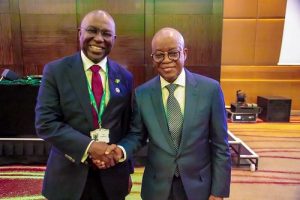AFCFTA: Nigeria Calls for Dismantling of Tariff, Non-tariff Barriers to Boost Intra African Trade

NSC CEO
*Nigeria has realized AFCTA is a game changer – Buhari
By Francis Ugwoke
In a bid to boost intra African trade and harness the potentials in African Continental Free Trade Agreement (AfCFTA), Nigeria on Monday appealed to the West, Central African sub-region to dismantle various tariff and non-tariff barriers currently hindering trade.
This was the position of the Executive Secretary, Nigerian Shippers Council (NSC), Hon. Emmanuel Jime at the ongoing three –day meeting of the Union of African Shippers’ Council (UASC) holding in Lagos.
Jime in his welcome address said African leaders must embrace tariff liberalization to boost intra-African trade.
He pointed out that trading within African countries was currently at a paltry 11 percent while Africa’s trade to global trade was at ridiculous 3percent.
He said the re-orientation and re-organisation of intra-Africa trade should start from West and Central Africa sub-region, explaining that when the region gets it right, it will be easier for other sub-regions in the African continental to trade among themselves.
He added. “I believe that AfCFTA is a very important tool to boost the African economy by increasing intra-African trade. When adequate measures are put in place to reduce tariff and non-tariff barriers that hamper trading between countries in the continent, then we will be on our way to achieving greater economic development for the continent.
“We all know that it is not an easy task, because a lot of things have been left undone in the past, but we can start now with great commitment and determination, we can achieve the Africa we all desire”.
He argued that if potentials in intra-African trade were effectively harnessed, the African economy would expand by 52.4percent.
He continued, “The United Nations Commission for Africa estimated that AFCTA would expand the size of Africa’s economy to US$29trillion by 2050 and increase intra-African trade to 52.3percent from the current 11 percent. Share of Africa’s trade to global trade is expected to double from current 3 percent with the implementation of the agreement. The re-orientation and re-organization of intra-African trade should start from our sub-region, when we get it right in West and Central Africa it would be much easier to connect and freely trade with other region of the continent.
“We need to create smooth integration of our transport infrastructures and trade policies as well as the required awareness among the economic operators in the sub-region. There is need to sensitize our various governments to fast track the dismantling of various tariff and non-tariff barriers that are hindering international trade. We should always look at the holistic impact which tariff liberalization would have on our economy rather than just considering the immediate shortfall.
The theme of this year’s 9th African Shippers Day is ‘ African Continental Free Trade Agreement: A Veritable Platform for African Shippers to Mainstream into Global Trade”.
In his speech, President Muhammadu Buhari said AFCTFA is expected to bring about a number of benefits that African producers would enjoy in terms of access to cheaper inputs and intermediate goods as well as larger markets for their products while consumers have access to cheaper goods and a broader variety of products.
Buhari who was represented on the occasion by the Minister of State for Transport, Prince Ademola Adegoroye said on their part African economies should experience gains from trade and further benefit from removing the onerous requirements belonging to multiple and overlapping trade agreements within the continent.
He said that the UN Economic Commission for AFRICA )eca) has forecasted that AFCFTA could boost intra-Africa trade by 62 percent with the industrial sector forecast to gain the most.
With this, he said GDP and exports would increase by US$44billion and US $56billion respectively and AFCFTA could potentially increase jobs and move informal traders into formal sector.
Noting that digitalization has been transforming the way businesses are done in Africa, he recalled that digitalization in 2011 impacted the GDP of Africa by US8.3bn in addition to 600,000 jobs on the continent.
However, he said for AFCTA to have positive influence on long-term investment in producing capacities, African government must develop appropriate supporting policies, build the requisite infrastructure and ensure an educated work force.
He said, “We need to actively promote productive employment and decent work place, women’s empowerment and food security and reduction in inequalities” .
He said that in Nigeria, government has realized that AFCTA would be a game changer when it comes to stimulating intra-African trade because the more ambitious the trade liberalization, the greater the expansion of Nigerian exports to its African partners.
By Francis Ugwoke
In a bid to boost intra African trade and harness the potentials in African Continental Free Trade Agreement (AfCFTA), Nigeria on Monday appealed to the West, Central African sub-region to dismantle various tariff and non-tariff barriers currently hindering trade.
This was the position of the Executive Secretary, Nigerian Shippers Council (NSC), Hon. Emmanuel Jime at the ongoing three –day meeting of the Union of African Shippers’ Council (UASC) holding in Lagos.
Jime in his welcome address said African leaders must embrace tariff liberalization to boost intra-African trade.
He pointed out that trading within African countries was currently at a paltry 11 percent while Africa’s trade to global trade was at ridiculous 3percent.
He said the re-orientation and re-organisation of intra-Africa trade should start from West and Central Africa sub-region, explaining that when the region gets it right, it will be easier for other sub-regions in the African continental to trade among themselves.
He added. “I believe that AfCFTA is a very important tool to boost the African economy by increasing intra-African trade. When adequate measures are put in place to reduce tariff and non-tariff barriers that hamper trading between countries in the continent, then we will be on our way to achieving greater economic development for the continent.
“We all know that it is not an easy task, because a lot of things have been left undone in the past, but we can start now with great commitment and determination, we can achieve the Africa we all desire”.
He argued that if potentials in intra-African trade were effectively harnessed, the African economy would expand by 52.4percent.
He continued, “The United Nations Commission for Africa estimated that AFCTA would expand the size of Africa’s economy to US$29trillion by 2050 and increase intra-African trade to 52.3percent from the current 11 percent. Share of Africa’s trade to global trade is expected to double from current 3 percent with the implementation of the agreement. The re-orientation and re-organization of intra-African trade should start from our sub-region, when we get it right in West and Central Africa it would be much easier to connect and freely trade with other region of the continent.
“We need to create smooth integration of our transport infrastructures and trade policies as well as the required awareness among the economic operators in the sub-region. There is need to sensitize our various governments to fast track the dismantling of various tariff and non-tariff barriers that are hindering international trade. We should always look at the holistic impact which tariff liberalization would have on our economy rather than just considering the immediate shortfall.
The theme of this year’s 9th African Shippers Day is ‘ African Continental Free Trade Agreement: A Veritable Platform for African Shippers to Mainstream into Global Trade”.
In his speech, President Muhammadu Buhari said AFCTFA is expected to bring about a number of benefits that African producers would enjoy in terms of access to cheaper inputs and intermediate goods as well as larger markets for their products while consumers have access to cheaper goods and a broader variety of products.
Buhari who was represented on the occasion by the Minister of State for Transport, Prince Ademola Adegoroye said on their part African economies should experience gains from trade and further benefit from removing the onerous requirements belonging to multiple and overlapping trade agreements within the continent.
He said that the UN Economic Commission for AFRICA )eca) has forecasted that AFCFTA could boost intra-Africa trade by 62 percent with the industrial sector forecast to gain the most.
With this, he said GDP and exports would increase by US$44billion and US $56billion respectively and AFCFTA could potentially increase jobs and move informal traders into formal sector.
Noting that digitalization has been transforming the way businesses are done in Africa, he recalled that digitalization in 2011 impacted the GDP of Africa by US8.3bn in addition to 600,000 jobs on the continent.
However, he said for AFCTA to have positive influence on long-term investment in producing capacities, African government must develop appropriate supporting policies, build the requisite infrastructure and ensure an educated work force.
He said, “We need to actively promote productive employment and decent work place, women’s empowerment and food security and reduction in inequalities” .
He said that in Nigeria, government has realized that AFCTA would be a game changer when it comes to stimulating intra-African trade because the more ambitious the trade liberalization, the greater the expansion of Nigerian exports to its African partners.





